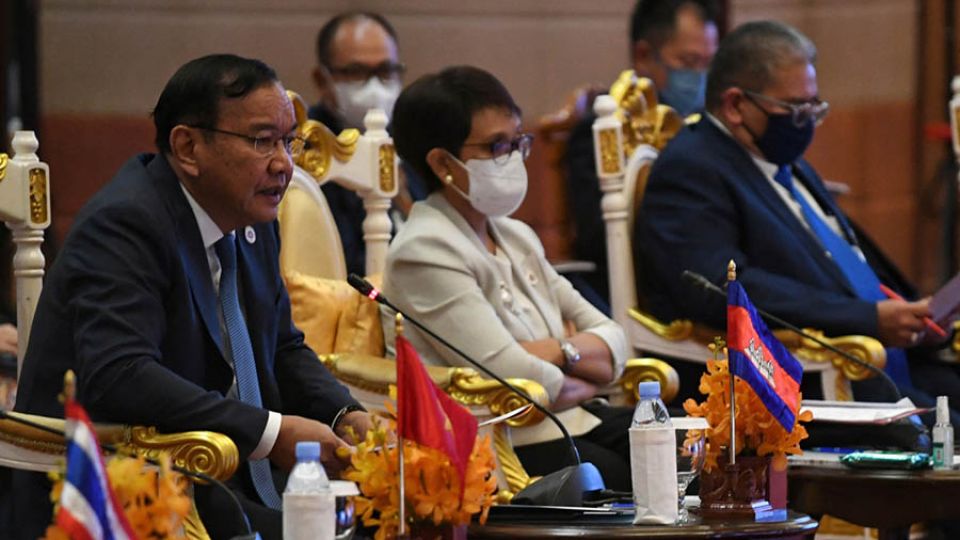October 27, 2022
JAKARTA – Indonesia is set to host a preparatory meeting of ASEAN foreign ministers on Thursday in Jakarta, which aims to help the region’s leaders decide how to handle junta-controlled Myanmar ahead of the grouping’s 40th and 41st summits in Cambodia next month, as calls grow to replace its Five-Point Consensus that critics have bemoaned as ineffective.
Myanmar has been in crisis since the Feb. 1, 2021 coup by the military junta that overthrew the democratically elected government of Aung San Suu Kyi. According to one monitoring group, more than 2,300 people have been killed in the junta’s brutal crackdown on dissent that followed.
Due to lack of progress on Southeast Asia’s response to the Myanmar crisis, ASEAN foreign ministers agreed in August to “closely monitor Myanmar” until the November summits, when ASEAN leaders would take further action on the junta’s noncompliance.
At a follow-up meeting last month in New York, Indonesia offered to host a meeting of ASEAN foreign ministers in Jakarta with a view to preparing the bloc’s next course of action.
Foreign Minister Retno L.P. Marsudi had since maintained “intensive communication” with her regional counterparts, she said during an interview with The Jakarta Post on Oct. 21 at the ministry, which included shuttling to Thailand, Malaysia and Singapore last week.
She had also kept an open line of communication with current ASEAN chair Cambodia to ensure “an advanced, strong and relevant ASEAN” ahead of the summit, Retno added.
“This year’s summit will be quite different, meaning that the challenges faced by ASEAN have been burdensome. On the external front we have [complicated] geopolitics. The internal issues are not any easier, including the Myanmar problem [which is] a pronounced trouble at the moment,” she said.
“A special discussion on Myanmar will surely be one of the summit’s focuses, especially on the implementation of the 5PC and how ASEAN will proceed going forward,” Retno added, referring to the Five Point Consensus.
‘Not interference’
As such, she continued, the upcoming ASEAN foreign ministers’ meeting would also put the spotlight on the current leadership in Naypyidaw.
“The meeting will specialize in summit preparations,” Retno said. “Some say this is a form of interference, but no: This is a reflection of ASEAN’s care toward one of its own members.”
ASEAN espouses a noninterference principle regarding its members’ domestic issues, and any decision by the bloc must be balanced, with a commitment to democracy and peace.
For founding member Indonesia, the meeting’s primary objective is to affirm a united group that upholds the ASEAN Charter’s values of democracy and peace without being “permissive” of the violation of those principles, according to the foreign minister.
Among Jakarta’s activities ahead of the upcoming meeting were Retno’s visits to Thailand, Malaysia and Singapore, which included “lengthy discussions [on] bilateral and regional issues, including the [November] summits”.
While Singapore has previously stated its disapproval of the “tragic situation in Myanmar”, the Justice for Myanmar (JFM) activist group identified in August 38 Singaporean companies that were allegedly linked to businesses involved in supplying arms to the junta. Meanwhile, reports started surfacing in October of sanctioned Myanmar tycoons accused of junta links sheltering in Singapore.
Human Rights Watch (HRW) has been issuing similar reports on Thailand since 2021, naming a Thai state-owned oil and gas company doing business with the junta.
In June, when Myanmar illegally entered Thai airspace to attack several villages in Karen state, Prime Minister Prayut Chan-o-cha responded by saying that the airspace infringement was “not a big deal”.
Call to disengage
The inconsistent messages on top of ASEAN’s seemingly ineffectual demands to the junta have sparked a growing movement of discontent.
On Tuesday, 457 Burmese and international civil society organizations issued an open letter to ASEAN calling for the group’s complete disengagement with the military regime, arguing that “any engagement with the junta is in breach of the ASEAN Charter”.
The letter says the ASEAN leaders’ consensus, as well as its special envoy to Myanmar, has proven ineffective, and that maintaining dialogue and visits to the nation will only “condone and embolden the illegal junta”.
“These imprudent engagements of the Special Envoy further caused extensive damage to the struggle of Myanmar’s people to end the military tyranny. […] Such actions stand in contrast to the 5PC’s promise to strive for a solution in the interests of the people,” the letter reads.
“We strongly urge ASEAN to move beyond the 5PC and develop a plan that includes clear benchmarks and indicators of success. [It] must establish actionable punitive measures.”
Analysts previously warned that failure to deal with the junta could vindicate ASEAN’s harshest critics that the bloc offered nothing more than a “toothless talking shop”.
Andrew W. Mantong, an international relations researcher at the Centre for Strategic and International Studies (CSIS) in Jakarta, said the unabating crisis should be a call for ASEAN to work out new mechanisms within its framework.
“The Myanmar case has arguably exhausted almost everything on the list of what ASEAN can do,” he said earlier this month.
Still-empty seat
The criticisms have not been lost on Indonesia, which takes over from Cambodia as the ASEAN chair at the end of next month’s summits, but Retno says ASEAN would continue to use “familial” dialogue.
For this week’s preparatory meeting, she said a seat would still be reserved for a nonpolitical representative from Myanmar, even though the junta was continuing to refuse to send anyone.
“We still invite Myanmar, but if it decides to send no one, […] their chair and flag will still be there,” said Retno. “There is no need for us to be held hostage by the situation.”


